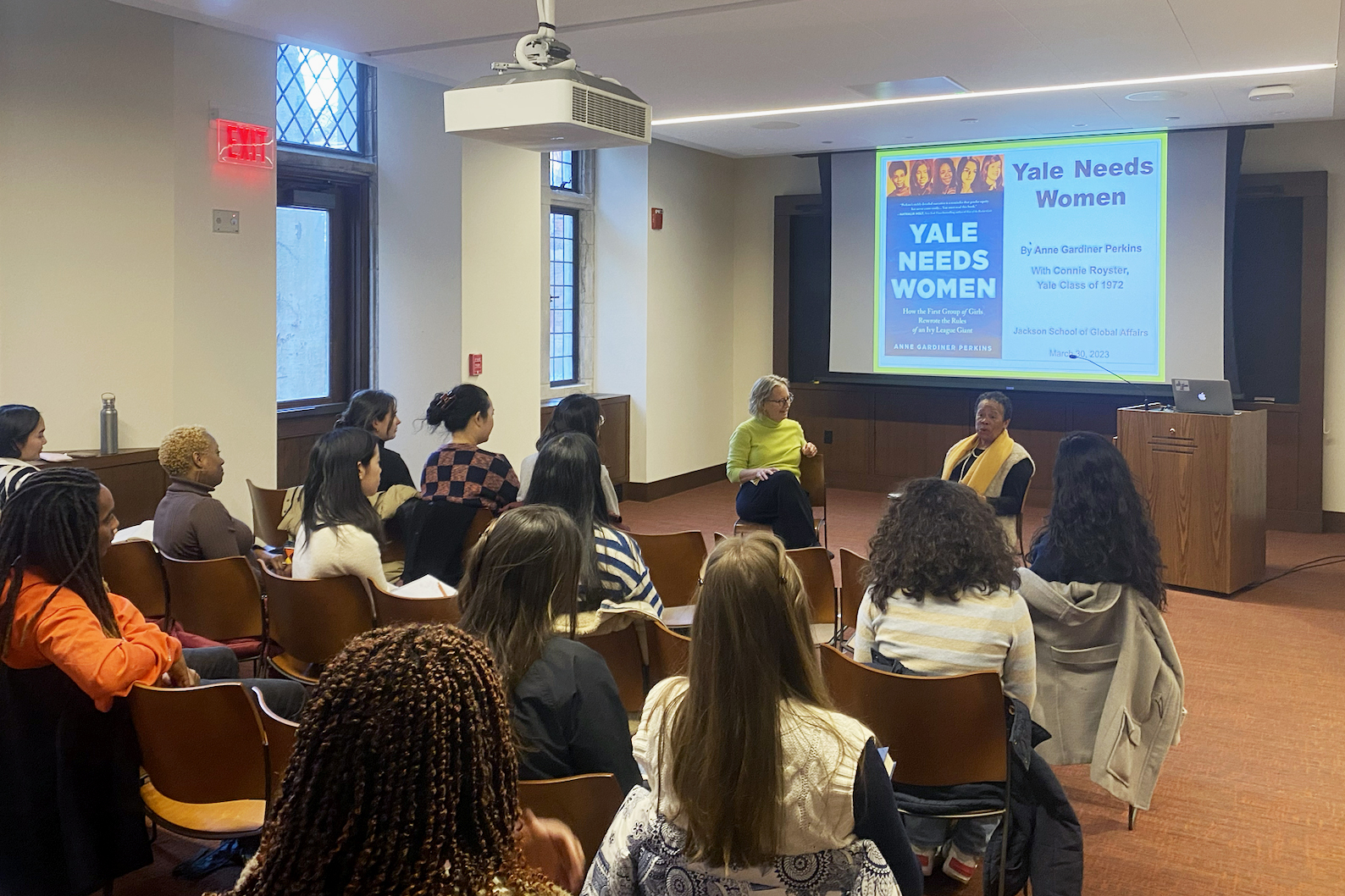Anne Gardiner Perkins ’81 and Connie Royster ’72 discuss legacy of Yale’s first class of women
On March 30, the Jackson Women group held a discussion circle with historian Anne Gardiner Perkins ’81, author of Yale Needs Women, and Connie Royster ’72, a member of Yale’s first undergraduate first-year class of women.

Courtesy of Jackson Women
Connie Royster ’72 enrolled at Yale College in 1969 — the year the institution first went co-ed.
One of only eight Black female sophomores admitted at the time, Royster would later be elected to a leadership position in the Yale Dramat, graduate cum laude, found a major minority- and women-owned New York law firm and serve as director of development at the Yale Divinity School. Historian Anne Gardiner Perkins ’81 chronicled Royster’s undergraduate experience in her book “Yale Needs Women: How the First Group of Girls Rewrote the Rules of an Ivy League Giant.”
On March 30, Gardiner Perkins joined Royster for a discussion circle held by Jackson Women, a student group for female-identifying students at the Jackson School of Global Affairs. The talk centered around the history of women at Yale, as well as Royster’s experience in what Perkins once dubbed as “the oldest men’s club in the nation.”
“Yale admitted women who were not afraid of stepping out,” said Royster. “[We] had enough experiences … to not be quashed by this place that had been dominated for 250 years by men.”
Gardiner Perkins began the event with a slideshow presentation outlining the first class of women in Yale College, which had remained all-male longer than any other college in the United States. Gender discrimination was “perfectly legal” in 1969; the 14th Amendment’s provision for equal protection under the law had not yet been judged to apply to women, while the Title IV protections of the 1964 Civil Rights Act applied to race but not gender.
Yale already had female graduate students, but they composed less than 10 percent of all the total student body. Sexual harassment by male professors was a serious issue, Gardiner Perkins said, and women were prevented from participating in most extracurricular life, from all competitive sports to marching band.
Jackson School of Global Affairs student Paulina Prasad JGA ’24 said it was striking “how recent all of this happened.”
“Sometimes we think of gender segregation and racial segregation as things of the past, but really it happened just about 60 years ago,” Prasad said. “Being around people who went through it really contextualizes how recent that was and where we are at Yale as an institution.”
Gardiner Perkins proceeded to ask Royster about her “sources of strength” during her time at Yale.
“I grew up in New Haven, so I had family here,” said Rosyter. “I also had classmates who would have been a year ahead of me who had been accepted to Yale, so I had a few friends already here … I knew I had those folks who were cheering me on.”
Moreover, she had the arts. Royster found a mentor figure in a dance instructor at the drama school, and got involved in the Yale Dramat, which had included women as actors in its productions prior to 1969.
Gardiner Perkins and Royster also discussed certain figures at Yale who supported the new female undergraduates.
Elga Wasserman, special assistant to the President for the Education of Women who oversaw the first few co-educational classes, was a “force of nature,” Royster remembered. Though she was given “no budget except for a part-time secretary,” Wasserman supported the security of female students, fought to ensure that Mory’s admitted women and issued annual reports across campus that raised awareness about Yale’s inadequate female population.
Gardiner Perkins additionally highlighted the work of Philip and Lorna Sarrel. Due to Yale’s fear of pregnancy scandals among its new co-ed student body, the Sarrels founded Yale’s gynecological service and sex counseling service.
“Though it was against the law in Connecticut for unmarried women to be given access to contraception, Phil handed it out to anyone who wanted it,” Gardiner Perkins noted. “They also talked with women about their relationships and created a really safe space for women to talk about sex at a time when there was a lot of pressure on the first year women to sleep with young men, whether they wanted to or not.”
The talk concluded with students asking for both alumnae’s advice on occupying new spaces for the first time, given Royster’s background and Gardiner Perkins’s experience as the first female editor-in-chief for the Yale Daily News.
Royster and Gardiner Perkins highlighted the need to be fearless, sharing that they had to find their strengths and confidence in their own voices.
“I think you need to be who you want to be,” said Gardiner Perkins. “That’s their problem if they don’t think you are measuring up.”
The event was held in Room 136 of the Humanities Quadrangle.







